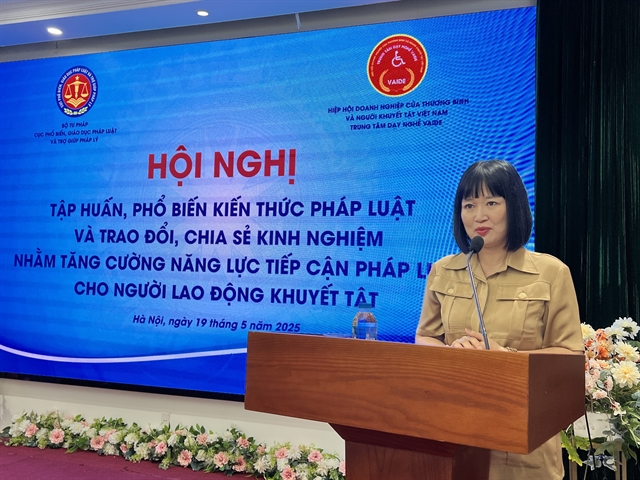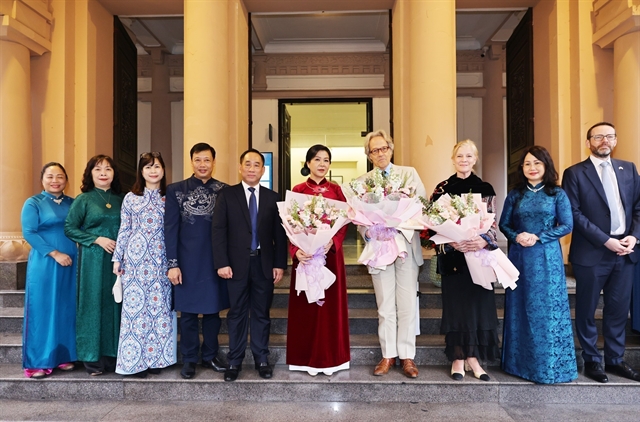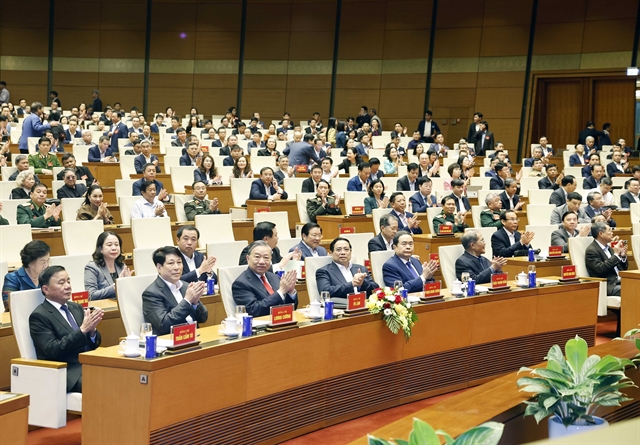 Society
Society


|
| Ngô Quỳnh Hoa, Deputy Director of the Department of Legal Education and Legal Aid under the Ministry of Justice, gives a speech at the conference. — VNA/VNS Photo Đỗ Bình |
HÀ NỘI — Experts discussed ways to enhance legal access capacity for workers with disabilities, during a conference held by the Ministry of Justice (MoJ) on Monday.
The Deputy Director General of the Mọ's Department of Legal Dissemination and Education, Ngô Quỳnh Hoa, told the forum that people with disabilities played an important role in creating material wealth for society, earning incomes to support themselves and their families.
Employment helps people with disabilities confidently overcome difficulties, integrate into the community and contribute to economic, cultural and social development, she said.
But, their participation in the labour market also faces many challenges, such as lack of professional skills, limited job opportunities, social awareness of people with disabilities has not improved significantly and public infrastructure is not suitable to support them in travelling and working.
In particular, disabled people’s awareness and understanding of legal issues, is still limited.
The conference was a way to share obstacles and propose recommendations and solutions to improve support effectiveness and legal education for people with disabilities, as well as for businesses who hire disabled workers.
Difficulties
Deputy President of the Việt Nam Association of Enterprises of Invalids and Persons with Disabilities Lê Văn Lộc said that in reality, most businesses owned by persons with disabilities faced many barriers in accessing the law, from information to legal procedures, to preferential policies that they should enjoy.
This significantly affects the businesses’ ability to work efficiency and their ability to develop sustainably.
Many disabled business owners do not have full and timely access to new legal documents, or have difficulty understanding and applying legal regulations.
Current forms of legal education are not really suitable for the needs and conditions of disabled people, especially those who are deaf, blind or have difficulty communicating.
Some localities do not have specialised staff or separate legal support programmes for disabled businesses, leading to ineffective advice and help.
Businesses owned by disabled people are often small-scale, lacking financial and human resources, making it difficult to hire private lawyers and legal advisors.
To solve the difficulties outlined, and to improve legal access, Lộc proposed developing a legal support network, establish volunteer lawyer groups and specialised legal consulting centres to provide free or low-cost support for them.
He suggested to encourage associations of people with disabilities to participate in providing legal consulting services and act as a bridge with authorities, as well as offering an online legal question and answer system online to promptly answer legal questions.
At the conference, delegates affirmed that in the global trend towards sustainable growth, Việt Nam cannot stand outside the trend of supporting business models towards social benefits.
Completing the legal system for businesses must not only meet practical needs, but also offer a long-term strategy to promote equitable, inclusive and sustainable development.
With a central role in building and perfecting the national legal system, the MoJ will be the pioneer in promoting legal policies to effectively recognise and support the business community. — VNS




